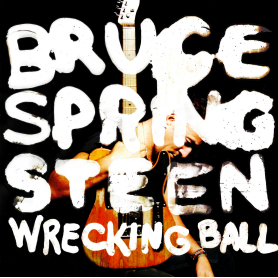By Nick Ubels (Contributor) – Email
Print Edition: March 21, 2012
 “In the squares of the city, in the shadow of the steeple
“In the squares of the city, in the shadow of the steeple
Near the relief office, I see my people
And some are grumblin’ and some are wonderin’
If this land’s still made for you and me.”
– Woody Guthrie, 1940
Bruce Springsteen closed his headlining set at this year’s South-by-Southwest music festival with a cover of this song, dustbowl-era troubadour Woody Guthrie’s abiding folk classic, “This Land Is Your Land.” It perfectly captures the spirit of his latest album, which situates Jersey’s favourite son in the tradition of populist American folk singers like Guthrie and Aunt Molly Jackson, who sang about the human cost of a failing economy with equal parts empathy and indignation.
Springsteen is more acutely troubled by issues of economic inequality and unfulfilled promises than ever before. The widening gap between the myth of the American Dream and the reality faced by the working and middle classes in the midst of this recession is a problem that underscores most of the songs here. More than just an angry protest record—though there are times when the Boss’s righteous fury is electrifying and powerful—Wrecking Ball both afflicts the comfortable and comforts the afflicted with tales of working class romance (“You’ve Got It,” “This Depression”), hard-scrabble spirituality (“Land of Hope and Dreams,” “Rocky Ground”) and by turning small town economic devastation into mid-tempo drinking songs (“Death to My Hometown”), foot-stomping folk anthems (“Easy Money”), or ballads about quiet courage in the face of uncertainty (“Jack of All Trades”).
An album of hymns, anthems, choruses, and ballads, Wrecking Ball is Bruce Springsteen’s most urgent, uncompromising and successful collection of original material since 2004’s Devils and Dust. “We Take Care of Our Own” establishes this hard-bitten disposition before the record’s first lyric is uttered with a tense electric guitar wavering uncertainly over a dramatic, thundering floor tom and snare riff. Springsteen’s signature Telecaster leads the rest of the band into a livid battle anthem condemning a neglected social contract, Bruce spitting lyrics like “From the shotgun shack to the Super Dome/ There ain’t no help, the cavalry stayed home.” The track brings to mind the Phil Specter wall-of-sound approach of Springsteen’s early records, replete with bombastic orchestral flourishes, chiming bells and shouted backing vocals.
Wrecking Ball can be loosely divided into three movements: the political rage of “We Take Care of Our Own” gives way to a series of dusty folk songs which artfully relay political truths through honest, character-driven stories before the record concludes with a trilogy of spirituals. The album’s centrepiece is its title track; ostensibly about the demolition of New Jersey’s Giants Stadium in 2010, “Wrecking Ball” also works as both an apocalyptic call-to-arms for the downtrodden (“Hold tight to your anger/ and don’t fall to your fears”) and a personal manifesto. It possesses the same bloody-knuckled desperation and desperate hope that has made Springsteen’s best music since 1978’s Darkness on the Edge of Town so enduring and cathartic. At the song’s climax, he dwells on the cyclical nature of economic security and life itself, importantly repeating “Hard times come and hard times go/ Just to come again.”
Fittingly, Springsteen freely draws on music born out of economic hardship to propel these tales: Celtic, American folk, East Coast R&B, soul, country, and gospel in addition to the usual strains of heartland rock. This diversity of styles is striking and effective, though there are a few tracks that don’t quite hit the mark musically. “This Depression” and “Rocky Ground” play it a little too safe, coming across as lacklustre and tame next to the wealth of captivating and dynamic music to match the message elsewhere on the album. Still, Wrecking Ball reaffirms that Bruce Springsteen’s ardent conviction, dramatic song craft and vivid storytelling are often a potent cocktail. There are moments on this album with enough intoxicating, life-and-death urgency to match that exuded by a much younger, scruffier-looking punk from New Jersey. Yet his lifelong pre-occupation with death and hardship now has an even greater weight earned by age and adversity.
“Land of Hope and Dreams” is anchored by a soaring solo by late E Street Band sax player Clarence “Big Man” Clemens, the soul of Springsteen’s legendary backing combo. In the liner notes, Scooter eulogizes his friend in typical Springsteen fashion: “Clarence doesn’t leave the E Street Band when he dies. He leaves when we die.” His self-made elegy is a powerful and rare brimming-heart moment where private loss and public despair bleed together in spectacular, widescreen fashion.
But as the album’s hoarsely whispered coda reminds us, “we are alive.” Another brief vision of that same, scruffy 20-year-old wildly speaking impossible promises into our ear. We can see the way that times have changed, and know they’ll change again.

